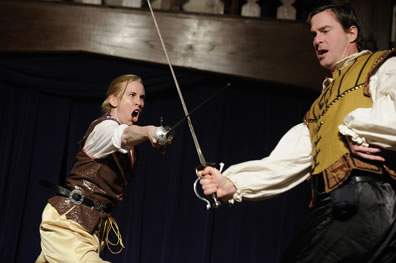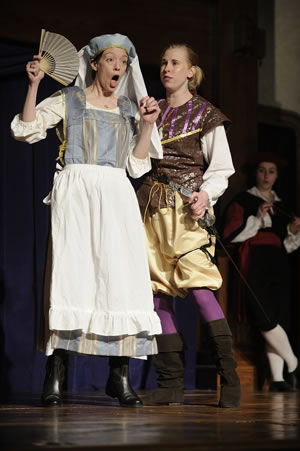Romeo and Juliet
Details Add Texture to This Fun Family Feud
Baltimore Shakespeare Factory, Great Hall Theatre, St. Mary’s Community Center, Baltimore, Md.
Sunday, April 14, 2013, Second pew, front right
Directed by Tom Delise

Mercutio (Barbara Madison Hauck) engages in a passado with Tybalt (Terry O'Hara) in the Baltimore Shakespeare Factory production of Romeo and Juliet. Below, Mercutio gets saucy with Nurse (Jenn Mikulski) as Peter (Tegan Williams) looks on. Photos by Will Kirk, Baltimore Shakespeare Factory.
Peter can't read. But he can remember. Capulet gives the servant a list of people to be invited to a masque, so Peter "must to the learned" to find out what is written on the paper. He happens upon Romeo and Benvolio. This is no more than a plot device to get Romeo—who discovers that his crush, Rosaline, is among those invited—to the party where he will meet Juliet. But what does Peter do as Romeo reads the list aloud? Tegan Williams, playing the servant in the Baltimore Shakespeare Factory's production of William Shakespeare's Romeo and Juliet, mimes characteristics of the invitees. We learn through her antics that Mercutio is a heavy drinker and that the Rosaline of Romeo's fancy is a dog (in appearance, in attitude, in both; you get the idea).
Director Tom Delise sticks close to tradition with this bare-stage, text-centric, audience-engaging Romeo and Juliet. It is set in Elizabethan Verona, with gorgeous Renaissance costumes by April Forrer, and much of the cast gives conventional readings to their characters. Delise even keeps in Chorus' second speech (spoken by the entire cast). However, Delise incorporates some keen details that add texture to the text.
Key among them are in the shaping of a sympathetic Tybalt as played by Terry O'Hara. His Tybalt is not a bad guy, just a younger-generation member of the Capulets caught up in the context of a family feud begun by his elders. He is the first to dance with Juliet at the party, and it is while she, all smiles, is with Tybalt that Romeo first spies her (Juliet's smile becomes constrained when Paris starts dancing with her). Tybalt sees the uninvited Romeo crashing the Capulet party, and as Romeo is a Montague, Tybalt can't help thinking that Romeo's purposes cannot be honorable. But Capulet (played throughout with stateliness by Frank Mancino) doesn't merely waylay Tybalt from attacking Romeo. He slaps him—in public (much to Mercutio's delight, too). No wonder this Tybalt has a score to settle with Romeo. But Romeo's reply of love when Tybalt insults him leaves O'Hara's Tybalt flummoxed, as Romeo's behavior doesn't at all fit his expectations.
Romeo's response also surprises Mercutio (Barbara Madison Hauck), so he and Tybalt expend their testosteronic frustration with a fencing match more in sport than seriousness, a bout meant to hurt, perhaps, but not maim, let alone kill. The mood is established by the tone of Mercutio's challenge to Tybalt: "Come, sir, your passado," Hauck says with a grin that is met with O'Hara's grin. Dan Burke's fight choreography captures the intended fun with just a hint of danger, and the fatal moment of Romeo's intervention is superbly played with gasp-worthy realism. This take on what turns out to be a deadly duel is not unusual (the Zefferelli film plays it this way), but Delise goes a step further: Because Tybalt is hurried away by his servant after wounding Mercutio his reason for returning to the stage is out of concern for Mercutio. Tybalt becomes so distraught at the news of Mercutio's death that he barely has a chance to defend himself before Romeo wrests his sword from him and kills him in a single thrust.
 Mercutio is not necessarily the drunk Peter depicted, but Hauck plays him with party-boy swagger. Cross-gender casting is not something to which I usually pay much heed, but in Hauck's portrayal I have to wonder if she sees in Mercutio many of the guys who have hit on her. Her Mercutio has an ego that grows out of his codpiece, a self-centered confidence in his jokes and gibes, and a way of strutting and posing meant to advertise himself as a man-boy of action. This is one of the most physical performances of Mercutio I've ever seen, and Hauck plays out the Queen Mab speech as much in mime as in verse. It's refreshing to see a Mercutio having so much fun, and it sharpens the tragic turn this play takes with his death.
Mercutio is not necessarily the drunk Peter depicted, but Hauck plays him with party-boy swagger. Cross-gender casting is not something to which I usually pay much heed, but in Hauck's portrayal I have to wonder if she sees in Mercutio many of the guys who have hit on her. Her Mercutio has an ego that grows out of his codpiece, a self-centered confidence in his jokes and gibes, and a way of strutting and posing meant to advertise himself as a man-boy of action. This is one of the most physical performances of Mercutio I've ever seen, and Hauck plays out the Queen Mab speech as much in mime as in verse. It's refreshing to see a Mercutio having so much fun, and it sharpens the tragic turn this play takes with his death.
Brendan Edward Kennedy is a charming Romeo, a flirt with any attractive woman he meets, including those in the audience. He gives an energetic reading to the part, poetical in his gestures as well as his speech. Kathryn Zoerb is a sweet Juliet, and her opening speech of the balcony scene captures the flush of first love, floating in an aura of fantasy that seems just out of reach but, oh, it's heaven enough just to dream. Once she gets over her shock at Romeo's presence, Zoerb plays Juliet's dawning realization that her fantasy is in fact coming to fruition.
Friar Laurence in the performance of Chris Cotterman seems to be lurching from one uncertain idea to the next, responding to developing events on the fly rather than forging a grand plan. "It strains me past the compass of my wits," he tells Juliet upon hearing the news of her impending marriage with Paris. Upon Juliet's supposed death, as Laurence is on stage for a good portion of the oh-woeing carried on by the Capulets before he shushes everybody, Cotterman plays the friar as quite pleased with himself—the potion worked, yes! Of course, everybody might have been much better off if he had heeded his instincts. "So smile the heavens upon this holy act that after-hours with sorrow chide us not," he says before marrying Romeo and Juliet.
Part of the overall Baltimore Shakespeare Factory experience is the preshow and intermission entertainment. Kennedy, Hauck, and Joshua Dickinson, who plays Benvolio, team up to sing Queen's "You're My Best Friend," and Kennedy leads the way with The Who's "Baba O'Riley" ("it's only teenage wasteland"). During the intermission, Kennedy and Zoerb, both with lovely voices, duet on a wistful version of "When the Right One Comes Along" from the TV show Nashville. At the end, the cast leads the audience in The Beatles' "All You Need Is Love." Another nice touch is the preshow introductory speech given as a version of the TV game show Family Feud, pitting the Capulets against the Montagues. Of course.
Eric Minton
April 19, 2013
Comment: e-mail editorial@shakespeareances.com
Start a discussion in the Bardroom



 Find additional Shakespeareances
Find additional Shakespeareances